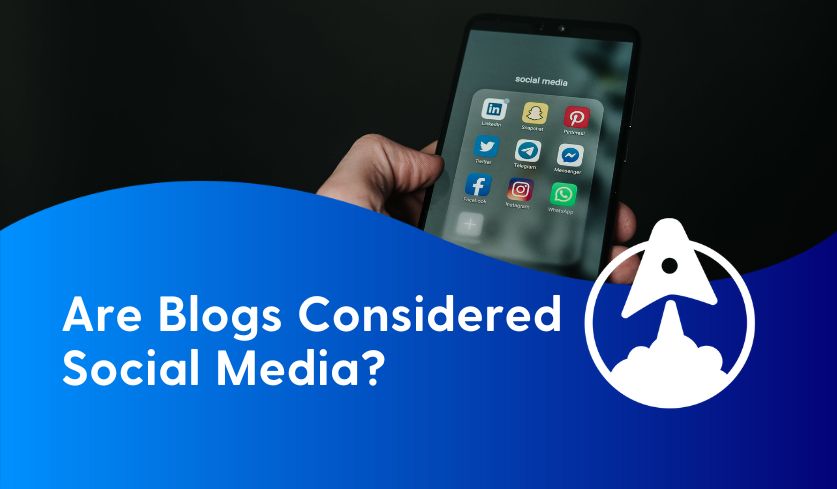Let us guess your favorite social media platforms — Facebook and Twitter? Instagram or TikTok? Notice that we didn’t guess “blogs” or any blogging platform. That’s because most people today would answer the question “are blogs considered social media?” with a resounding “no.”
At one point, though, blogs were the only form of social media. Fast forward to now, and the broader — and more widely used — social media landscape includes platforms that look much different. Below, we’ve explained why blogs were once more readily grouped in with social media, why they aren’t today, and why both still matter.
Are blogs considered social media?
Technically, yes, but in the modern sense, not quite. Blog posts technically count as social media since they were among the first ways people could share thoughts on the internet and interact with others via comments. This made early blogging a form of social media since it was media that was social — conversations happened between bloggers and readers. Any present-day blog with comments enabled thus technically counts as social media.
However, blogging and social media, based on how we use the latter term today, are definitely not the same. When you scroll through feeds on today’s major social media platforms, you probably aren’t expecting to encounter paragraphs upon paragraphs of text. You might instead expect this if you’re searching Google for a topic — and much of what you find will be blogs. You’ll see these longer posts on companies’ websites, not social media sites.
Blogging vs. social media: What are the differences and similarities today?
Blogging and social media are similar in that, through them, you can speak directly with your audience, in exactly your voice. You can also write a good number of paragraphs in Instagram captions, Facebook posts, and blog posts (although it’s not guaranteed someone will stick around to read the whole thing). Additionally, both blog posts and social media allow readers to comment. On top of this, both blogs and social media are key for acquiring, engaging, and growing an audience in any content marketing strategy.
Where blogs exist on your website, though, your social media presence exists through your brand’s pages on social networking sites. Your audience can directly follow your social pages to see your content in their feeds, whereas readers can’t as easily follow a blog – they have to sign up for an email or use tools like an RSS feed to get those updates. Beyond these surface-level differences, blog posts may run thousands of words, which is much longer than a typical social media post. Where you quickly share news on social media, you go in-depth on a topic in blogs.
What are the benefits of blogging?
Blogging brings a host of benefits, including:
- It shores up your search engine optimization. SEO-informed blogging and article writing (and yes, there’s technically a difference between them) can help establish your site as an authority on the topic at hand. That, in turn, signals to search engines that you’re worthy of the top spots on search engine results pages (SERPs). It can also help you earn backlinks from other websites, which is also great for SEO.
- It’s a way to connect with your audience. On your blog, you have an opportunity to share whatever you’d like with your audience. Here, you can tailor content to niche audiences, share a product announcement, or let readers know about a recent appearance on a podcast. The possibilities are endless and they’re truly what you make of them.
- It gives people something to share. When connecting with others in marketing, you often have to give a little something to build relationships with customers. A blog is a great way to assemble and showcase advice, tips, and helpful information that resonates with potential and current customers.
What are the benefits of social media?
There’s no shortage of reasons to leverage social media for your business, but three important ones are:
- It gives you a platform to reach new customers. With billions of daily users, the potential for platforms like Facebook and TikTok for your business is boundless. Whether through organic content creation or an ad campaign, you have access to valuable data you can use to tailor your marketing efforts.
- It’s a great platform for collecting and showcasing reviews. When customers have great things to say about your product or service, ask them to share the review on Facebook. These reviews are quite important to people researching your company and looking for experiences from others who’ve worked with you before.
- It’s a way to interact with existing customers. A touch of personalization can go a long way in winning customers and encouraging them to come back. Interact with posts about your products or services by thanking the poster, leaving a compliment, and sharing that content with your audience as social proof.
Why should you integrate blogging with your social media?
It’s not blogging vs. social media. It’s blogging and social media.
Integrating blogging and social media is the foundation of any strong digital marketing strategy. Coordinating your blog posts with your social media can benefit your brand awareness in the following ways.
- Maximizing your reach. The more content you post, the larger your brand’s internet thumbprint. With this larger thumbprint, your business’s reach increases. Every post, whether blog or social, is another chance for a potential new customer to find you.
- Increasing website traffic. Social media posts tied to your blog entries may drive more visitors from the former to the latter. Any visitors who then find your blog posts compelling may take the time to further explore your website. This means that a coordinated social media and blogging strategy can drive your website traffic.
- Bolstering customer engagement. When people regularly encounter content from your brand in the same handful of places, they grow stronger connections with your brand. From these improved connections come better customer engagement, leading to better business outcomes.
- Improving your topic choices. Posting your blogs on social media is an easy and low-cost way to see whether your audience likes what you write. You can get this information right from each of your social platforms’ analytics dashboards. Ask yourself: Which social posts linking to your blogs get the most engagement? You can safely assume these are the topics about which your audience wants more content.
- Writing better copy. Your social media posts about your blogs may generate user comments. These comments may tell you what readers liked the most about a certain blog post. You can keep these principles in mind as you create future content to write copy that best suits your audience. If a certain person found the examples you newly included in your most recent blog helpful, you’ll know better copy means more examples.
How to integrate blogging with your social media
Integrating blogging and social media is among the easiest parts of content development and social media marketing. Here are some tips for doing this well.
1. Set up a blog posting calendar
Don’t let the name fool you — a blog posting calendar can include social media posts too. This calendar is a key tool for organizing your content, consistently posting it, and giving yourself an overview of your near-future content plans. It also cuts down on errors and makes it easier to track the progress of any posts currently in drafting. And perhaps best of all, you can use it to post about your blogs on socials the moment they go live.
2. Look at social media holiday calendars
Creating content for holidays is a tried and true marketing tactic for aligning your blogs and social posts. For example, if National Donut Day is coming up and it’s pertinent to your business, you may want to post about it on social media. That’s a great idea — and coupling that post with blog content is even better! You can write a listicle blog about the best chocolate donut recipes in your cookbook or announce the addition of cronuts (remember those?) to your bakery. You can then post it on socials and offer a discount for social followers who’d rather have you make their donuts for them.
3. Always post your blog posts on social media
Publishing a blog post is always a good reason to post on social media too. In fact, after a while, you might gradually get in the habit of realizing you should create social content any time you post a blog. Plus, writing social captions might take only a few minutes — you already have the bread and butter of it in your blog. This can make it faster to post your blogs everywhere — Facebook, Instagram, Twitter, LinkedIn, you name it.
4. Use your blogging keywords as social media hashtags
Blogs can rank higher on SERPs when they include keywords for which people are searching. You can use these keywords as hashtags for your social posts so that similar audiences on different platforms see your content. You can also use these keywords as tags on your blog. Over time, you’ll create a catalog of content that readers can easily visit and browse, fortifying your internet presence.
Are blogs considered social media? No — but you need both
By today’s standards, blogs aren’t quite social media. The two, though, do go together hand in hand, and that’s important for your marketing strategy. Coordinating posts on each about the same topic — or posting on socials to promote your newest blog — is key to visibility. It’s also an approach that yields better results when your copy is strong.
At SCS Creative — with an award-winning former journalist in the lead — we create blog posts that you’ll be proud to share on socials. Our blogging work leads to tremendous boosts in our clients’ search engine rankings, quantity of ranking keywords, and number of overall impressions. The blogs we write are highly informative and engaging, and they’ll move mountains on your socials too.
When you work with SCS Creative, top-quality blog posts are only the start. You’ll get blog content with which you can more easily engage your social media audience — and the increased website traffic to show for it.






